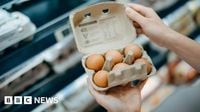British households are feeling the pinch yet again as food prices have surged at their fastest rate in 18 months, driven by sharp increases in the cost of chocolate, butter, and eggs. According to the latest British Retail Consortium (BRC)-NIQ Shop Price Monitor, food inflation climbed to 4.2% in August 2025, up from 4% in July, marking the highest level since February 2024. For many, this uptick means a tougher time at the checkout and more pressure on already stretched family budgets.
The numbers are stark. Fresh food inflation accelerated to 4.1% in August, jumping from 3.2% the previous month, with dairy products leading the charge. According to BBC, staples such as butter and eggs have seen significant price increases due to a combination of high demand, tightening supply, and increased labor costs. Chocolate, a beloved treat for many, has not been spared either. Its price has risen sharply as global cocoa prices have soared, a consequence of poor harvests linked to climate change and crop disease.
Helen Dickinson, chief executive of the BRC, put it plainly: "Shop price inflation hit its highest rate since March last year, fuelled by food price rises. This adds pressure to families already grappling with the cost of living. Retailers continue doing everything they can to limit price rises for households, but as the Bank of England acknowledged, the £7 billion in new costs flowing through from last year's budget has created an uphill battle for retailers." This sentiment was echoed across multiple outlets, including the Liverpool Echo and Manchester Evening News, highlighting the mounting challenges for both consumers and retailers.
The Bank of England has pointed to the rise in national insurance contributions in April 2025 as a key factor in accelerating food prices. This policy change, intended to bolster public finances, has instead rippled through the economy, increasing costs for businesses and, ultimately, for shoppers. The BRC's Shop Price Monitor also revealed that overall shop price inflation rose to 0.9% in August, even as non-food items experienced a price deflation of 0.8%.
Mike Watkins, head of retailer and business insight at NIQ, explained, "The uptick in prices reflects several factors: global supply costs, seasonal food inflation driven by weather conditions, the conclusion of promotional activity linked to recent sporting events, and a rise in underlying operational costs. As shoppers return from their summer holidays, many may need to reassess household budgets in response to rising household bills."
Indeed, the squeeze is being felt across the board. The Office for National Statistics (ONS) reported that the cost of food and non-alcoholic beverages rose by 4.9% in the year to July 2025, up from 4.5% in June. The broader inflation picture is just as concerning, with the Consumer Price Index (CPI) rising to 3.8% in July from 3.6% the previous month. Over the past five years, food prices have increased by a staggering 37%, according to ONS data, underscoring the long-term nature of this challenge.
While the headlines have focused on the surging cost of food, there have been small pockets of relief. As the new academic year approaches, parents have found some respite in lower prices for clothing, books, stationery, and computing supplies. But these savings are little comfort when the essentials—bread, butter, eggs, and chocolate—are becoming ever more expensive.
The situation has not gone unnoticed by business leaders. Over 60 retail executives, including those from Tesco, Sainsbury's, and Boots, wrote to Chancellor Rachel Reeves last week, warning that further tax hikes in the upcoming autumn budget could undermine efforts to improve living standards. The letter, coordinated by the BRC, predicted that food and drink inflation could hit 6% later this year if current trends continue. It's a sobering forecast, especially for households already struggling to keep up.
Retailers, for their part, are striving to shield consumers from the worst of the increases. Helen Dickinson emphasized, "Retailers continue doing everything they can to limit price rises for households, but as the Bank of England acknowledged, the £7 billion in new costs flowing through from last year's budget has created an uphill battle for retailers." The struggle is real; with rising operational costs, global supply chain disruptions, and unpredictable weather affecting harvests, businesses are fighting on multiple fronts.
The impact of these price rises is not limited to Britain. Ukrainian families, too, are feeling the effects, with grocery bills climbing amid an unstable economic situation. Many are being forced to find ways to save and stretch their money further, a sentiment echoed by families across Europe and beyond as global food markets remain volatile.
Digging deeper into the causes, it becomes clear that the current inflationary pressures are the result of a perfect storm. Global supply chain issues, exacerbated by climate-related disruptions, have led to reduced harvests and higher transportation costs. For chocolate lovers, the news is particularly bitter: poor cocoa harvests in West Africa, the world's leading cocoa-producing region, have pushed prices to record highs. The situation is further complicated by rising labor costs and the end of promotional discounts that had previously cushioned the blow for consumers.
Weather has also played a role. Seasonal food inflation, driven by unpredictable weather patterns, has led to shortages and higher prices for fresh produce and dairy. The conclusion of major sporting events, which often prompts retailers to offer temporary discounts, has also contributed to the recent uptick in prices as those deals have now ended.
For many households, the response has been to tighten belts and seek out savings wherever possible. But with the essentials rising in price and wages failing to keep pace, the cost-of-living crisis shows no sign of abating. As Mike Watkins of NIQ observed, "As shoppers return from their summer holidays, many may need to reassess household budgets in response to rising household bills." It's a refrain that's becoming all too familiar in kitchens and living rooms across the country.
As autumn approaches and policymakers prepare for the next budget, all eyes will be on Chancellor Reeves and the Bank of England. The choices they make in the coming months will shape the financial landscape for millions of households. With predictions of further inflation on the horizon, the pressure is on to find solutions that balance the needs of businesses, workers, and families alike.
For now, as the cost of a simple breakfast rises and the weekly shop stretches ever thinner, British families are left hoping for relief—and watching the headlines for any sign that the tide might soon turn.


